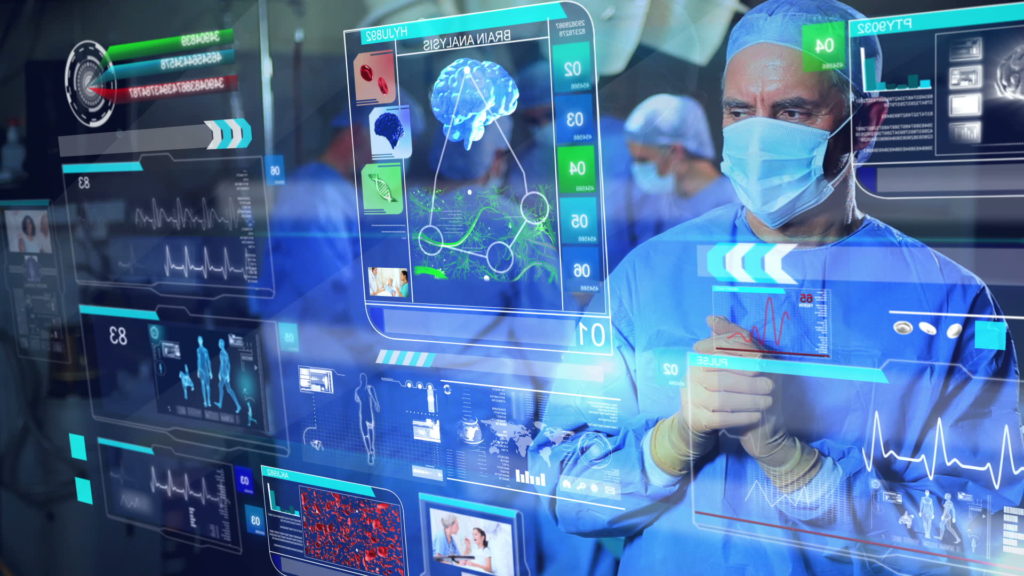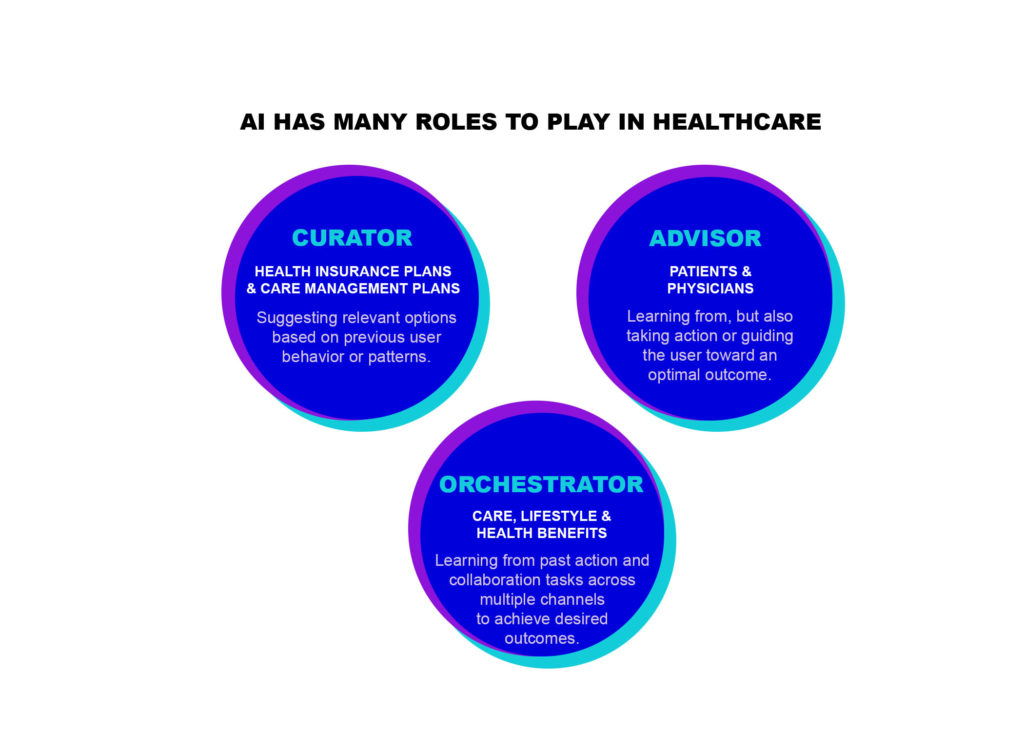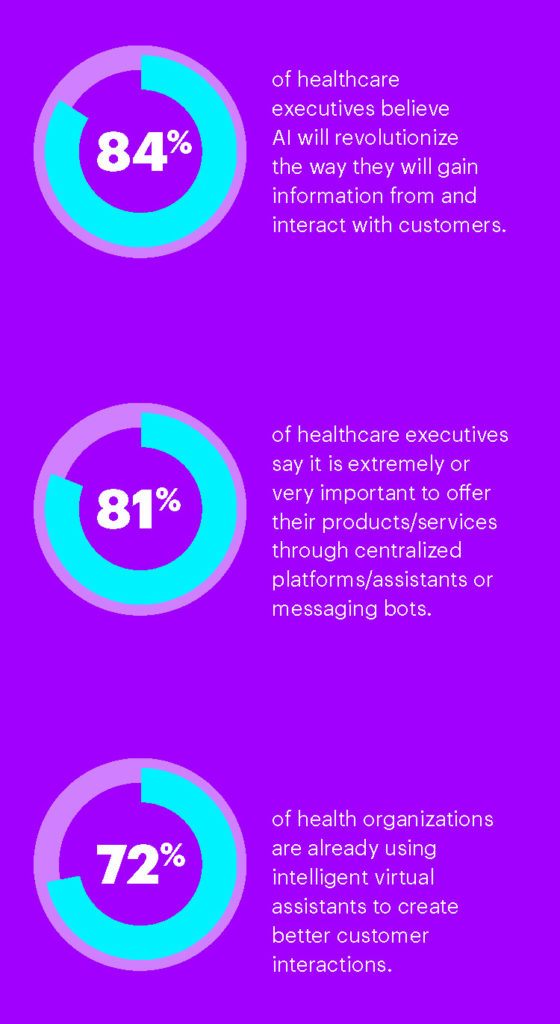
The DFW Hospital Council (DFWHC) is posting blogs submitted by our Associate Members. The following is the first of a series provided by Accenture. For guidelines, please contact Chris Wilson at chrisw@dfwhc.org.
The Accenture Digital Health Technology Vision explores five trends that underscore the importance of technology for people:
• Trend 1—AI is the New UI: Healthcare Experience Above All
• Trend 2—Ecosystem Power Plays: Beyond Health Platforms
• Trend 3—Workforce Marketplace: Invent Your Future Healthcare Workforce
• Trend 4—Design for Humans: Inspire New Behaviors
• Trend 5—The Uncharted: Redefining the Rules of Healthcare
In this first of a series of blog posts, we will show how these trends demonstrate that while technology is all around us, we are at the center. When we adapt technology to the people who use it in healthcare—health insurers, providers and consumers—we will define the future of healthcare.
Trend 1—AI is the New UI: Healthcare Experience Above All
It’s a new world where artificial intelligence (AI) is moving beyond a back-end tool for the healthcare enterprise to the forefront of the consumer and clinician experience.
Artificial intelligence is taking on more sophisticated roles within technology experiences with the potential to make every interface both simple and smart—setting a high bar for how future interactions work.
Robots are working alongside people. Smart machines are performing triage to augment clinician decision making. Contextual intelligence and deep learning algorithms are raising the bar for transactions and interactions in healthcare. The relationships between healthcare organizations and people will never go away. But AI will play a primary role in making those relationships stronger through new AI-driven services that help curate, advise and orchestrate lifestyle and care for people.

Simplifying Natural Interactions
People will direct and control artificial intelligence to fit their lifestyle and healthcare needs and goals.
A barrier to healthcare self-service has been that people don’t know where to look for information, leading to difficult and discouraging interactions. Or, they get no personal guidance outside the four walls of a doctor’s office. As technology becomes simpler, smarter and interfaces are more usable to consumers, it improves the customer experience. Systems that have the right rules, algorithms and intelligence behind them will know about the healthcare consumers—their medical history, allergies, past procedures and lifestyle behaviors—and use that information to guide personalized experiences.
Information will be brought to users in context, and tailored to the individual patient. Imagine easily knowing: “This is what your procedure will cost,” “Here are your medical benefits” or “Contact your doctor when you experience this symptom.” No more hunting for answers; they will be pushed to you or you can simply ask Amazon Alexa for information at the point of need.
Augmenting the Healthcare Workforce
When AI is the engine fueling the back end of the enterprise, it can guide employees to better advise consumers.

For example, health plans have a wealth of structured and unstructured data that can be used as a training set to improve business decision making and create a continuous loop of learning. Insurers can use advanced economic models and data science to predict a consumer’s future healthcare usage and determine the best plans to meet their needs. AI also has potential to alleviate the burden of time-consuming processes, such as prior authorization and underwriting.
As AI becomes more sophisticated, it will increasingly become a partner to clinicians, helping automate encounters and support diagnoses, thus improving labor productivity and diagnostic decision making. FDA-approved Arterys Cardio DL™ uses AI imaging to complement the work of clinicians and assist with diagnosing heart problems. The software delivers editable automated contours, providing precise ventricular function in seconds to help clinicians determine the right path forward for a patient.
AI is also more readily able to help clinicians, as it has become more intuitive and easier to use. Interfaces are now conversational and speech recognition has gotten closer to natural language, simplifying the capture of key interactions and allowing EHR data entry to happen behind the scenes.
AI is like a smart sponge—the more data it absorbs, the more intelligent it gets. As data from personal health devices, internet of health things solutions, DNA testing, genome sequencing, electronic medical records and more informs AI tools, clinicians will have keener ability to offer predictive recommendations based on a holistic view of the patient that learns over time. For instance, having insights to inform tailored guidance on the right diet and exercise plan to minimize chronic conditions, or suggestions for preventative screening to pursue, such as early testing for Alzheimer’s Disease.
AI will not substitute for clinical judgment. However, it equips providers with information and answers at speed, so that they may spend more time on activities that add value to the patient experience—high-touch interactions that a machine could never replace. These interactions will continue to improve as technology becomes more embedded in our environment, patients navigate their doctor’s treatment plan with greater ease and there is broader adoption of digital experiences.
Tapping the Benefits of AI
HealthTap, a World Economic Forum Technology Pioneer, is the world’s first global health practice delivering immediate, world-class healthcare 24/7 from query-to-cure. Through video, voice, and text chat on any mobile device or personal computer, HealthTap connect hundreds of millions of people in 174 countries with the most trusted and compassionate health advice from a network of more than 107,000 top doctors. HealthTap’s proprietary, robust, and secure Health Operating System (HOPES™) and proprietary triaging technology enable hospital systems, insurance companies, employers and governments to deliver the right care at the right time at the right price.
In 2016, HealthTap launched Dr. A.I., a personal AI-powered “physician” that instantaneously translates a person’s symptoms into personalized, doctor-recommended courses of action. Dr. A.I. uses advanced deep learning algorithms and HealthTap’s vast repository of doctor knowledge and data to apply clinical expertise and guide patients to the right level of doctor-recommended care.
About Accenture Insight Driven Health
Insight driven health is the foundation of more effective, efficient and affordable healthcare. That’s why the world’s leading healthcare providers and health plans choose Accenture for a wide range of insight driven health services that help them use knowledge in new ways—from the back office to the doctor’s office. Our committed professionals combine real-world experience, business and clinical insights and innovative technologies to deliver the power of insight driven health. For more information, visit: www.accenture.com/insightdrivenhealth
Accenture is in no way promoting or intending to market any one particular solution or product or otherwise offer or market a medical device or clinical solution. Each company uses its own operations to ensure compliance with applicable laws and regulations.
Accenture – Technology for People Part 1
11/29/2017